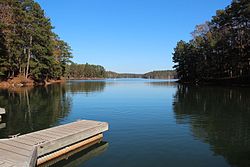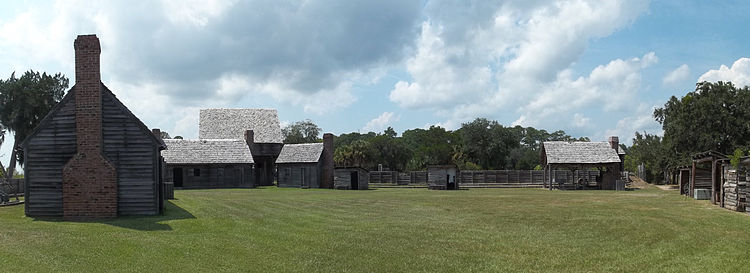Portal:Georgia (U.S. state)
The Georgia (U.S. state) PortalGeorgia /ˈdʒɔːrdʒə/ ⓘ is a state located in the southeastern United States. It was established in 1732, the last of the original Thirteen Colonies. Named after King George II of Great Britain, Georgia was the fourth state to ratify the United States Constitution, on January 2, 1788. It declared its secession from the Union on January 21, 1861, and was one of the original seven Confederate states. It was the last state to be restored to the Union, on July 15, 1870. Georgia is the 24th most extensive and the 8th most populous of the 50 United States. From 2007 to 2008, 14 of Georgia's counties ranked among the nation's 100 fastest-growing, second only to Texas. Georgia is known as the Peach State and the Empire State of the South. Atlanta is the state's capital and its most populous city. Georgia is bordered on the south by Florida; on the east by the Atlantic Ocean and South Carolina; on the west by Alabama; and on the north by Tennessee and North Carolina. The northern part of the state is in the Blue Ridge Mountains, a mountain range in the vast Appalachian Mountains system. The central piedmont extends from the foothills to the fall line, where the rivers cascade down in elevation to the continental coastal plain of the southern part of the state. The highest point in Georgia is Brasstown Bald, 4,784 feet (1,458 m); the lowest point is the Atlantic Ocean. Georgia is the most extensive state east of the Mississippi River in terms of land area, although it is the fourth most extensive (after Michigan, Florida, and Wisconsin) in total area, a term which includes expanses of water which are part of state territory.
Selected article -Providence Canyon State Outdoor Recreation Area is a 1,003 acres (4.06 km2; 1.57 sq mi) state park located in Stewart County in southwest Georgia. The park contains Providence Canyon, which is sometimes called Georgia's "Little Grand Canyon". It is considered to be one of the Seven Natural Wonders of Georgia. Providence Canyon actually is not a purely natural feature — the massive gullies (the deepest being 150 feet) were caused by erosion due to poor farming practices in the 19th century. It is also home to the very rare plumleaf azalea. The park lies on marine sediments—usually loamy or clayey, with small areas of sand. Loamy sand topsoils overlie subsoils of sandy clay loam, sandy clay, or clay in most of the uneroded section. Nankin, Cowarts, Mobila, and Orangeburg are the most prominent soil series. The canyons have much exposure of clay, over which water often seeps. Water is mobile in this well drained area. One of the quirkier attractions of the state park is an abandoned homestead including nearly a dozen rusty, 1950s-era cars and trucks. Due to the environmental damage that removing the vehicles would cause, park officials have decided to leave them alone. Selected picture - Credit: Thomson200
Lake Allatoona (rarely called Allatoona Lake, its government name) is a U.S. Army Corps of Engineers reservoir in Georgia, located in northwestern metro Atlanta. The lake is mostly in southeastern Bartow County and southwestern Cherokee County. Red Top Mountain State Park is located on its shores, on the peninsula between the Etowah and Allatoona arms of the lake. State facts
State symbols:
Selected biography -James Longstreet (January 8, 1821 – January 2, 1904) was one of the foremost Confederate generals of the American Civil War and the principal subordinate to General Robert E. Lee, who called him his "Old War Horse." He served under Lee as a corps commander for many of the famous battles fought by the Army of Northern Virginia in the Eastern Theater, but also with Gen. Braxton Bragg in the Army of Tennessee in the Western Theater. Biographer and historian Jeffry D. Wert wrote that "Longstreet ... was the finest corps commander in the Army of Northern Virginia; in fact, he was arguably the best corps commander in the conflict on either side." Longstreet's talents as a general made significant contributions to the Confederate victories at Second Bull Run, Fredericksburg, and Chickamauga, in both offensive and defensive roles. He also performed strongly during the Seven Days Battles, the Battle of Antietam, and until he was seriously wounded, at the Battle of the Wilderness. His performance in semiautonomous command during the Knoxville Campaign resulted in a Confederate defeat. His most controversial service was at the Battle of Gettysburg, where he disagreed with General Lee on the tactics to be employed and reluctantly supervised the disastrous infantry assault known as Pickett's Charge. He enjoyed a successful post-war career working for the U.S. Government as a diplomat, civil servant, and administrator. However, his conversion to the Republican Party and his cooperation with his old friend, President Ulysses S. Grant, as well as critical comments he wrote in his memoirs about General Lee's wartime performance, made him anathema to many of his former Confederate colleagues. Authors of the Lost Cause movement focused on Longstreet's actions at Gettysburg as a primary reason for the Confederacy's loss of the war. His reputation in the South was damaged for over a century and has only recently begun a slow reassessment. Selected anniversaries for May
Did you know -
CategoriesSelect [►] to view subcategories
WikiProjects
What are WikiProjects? Selected panoramaCredit: Ebyabe
Fort King George was a fort located in the U.S. state of Georgia. The fort was built in 1721 along the Altamaha River and served as the southernmost outpost of the British Empire in the Americas until 1727. The fort was constructed in what was then considered part of the colony of South Carolina, but was territory later settled as Georgia. It was part of a defensive line intended to encourage settlement along the colony's southern frontier, from the Savannah River to the Altamaha River. Great Britain, France, and Spain were competing to control the American Southeast, especially the Savannah-Altamaha River region. Selected quoteQuality content
Featured articles
Featured lists
Featured pictures
TopicsThings you can doedit · history · watch · purge Related portalsAssociated WikimediaThe following Wikimedia Foundation sister projects provide more on this subject:
Discover Wikipedia using portals |





























